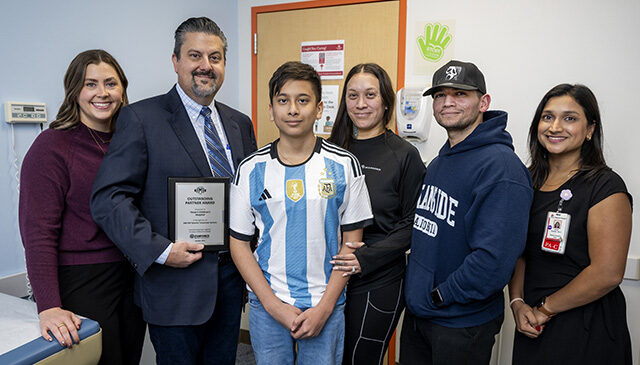
Texas Children’s Hospital is proud to celebrate new treatment milestones for two of our world-renowned programs. Congratulations to the Motion Analysis & Human Performance Laboratory on 1,000 clinical gait studies conducted, and to the Pectus Program on 1,000 pectus carinatum patients treated.
The Motion Analysis & Human Performance Lab at The Woodlands Campus, part of our nationally ranked Orthopedics program and one of the only pediatric labs of its kind in the state, celebrated their milestone back in October and continues to grow in prominence.
The laboratory leverages the expertise of a team of physicians, therapists, biomechanists and exercise physiologists, along with state-of-the-art computer and sensor technology, to study and improve how the human body moves. There are two different clinical focuses and groups of patients served by the lab – patients who have been referred for clinical gait analysis due to a movement disorder or underlying condition affecting their ability to walk, and those seeking sports performance assessments. Click here to watch a video highlighting these services.
Texas Children’s Pectus Program is part of the Division of Pediatric Surgery and led by a multidisciplinary team treating an assortment of chest wall abnormalities. The two most common types are pectus carinatum or “pigeon chest,” which is a deformity where the breastbone and ribs are pushed outward, and pectus excavatum, where the chest has a sunken or caved-in appearance.
The standard treatment for pectus carinatum has radically improved over time – shifting from large and complicated surgeries to nonsurgical bracing. Bracing is both highly effective and free of major complications, often taking several months to two years to correct, depending on how fast and how much a child grows.
“We are incredibly proud of our team for reaching this important milestone,” said Dr. Mark V. Mazziotti, Director of the Pectus Program. “People with pectus carinatum often struggle with reduced self-esteem…successful treatment can therefore have an immediate impact on self-image, as well as on quality of life in the long run. Our Pectus Program is highly specialized and prides itself on offering individualized care – we are privileged to make a life-changing difference for so many patients across Texas, the region and the country.”
Click here to read the full story on the Pectus Program.

